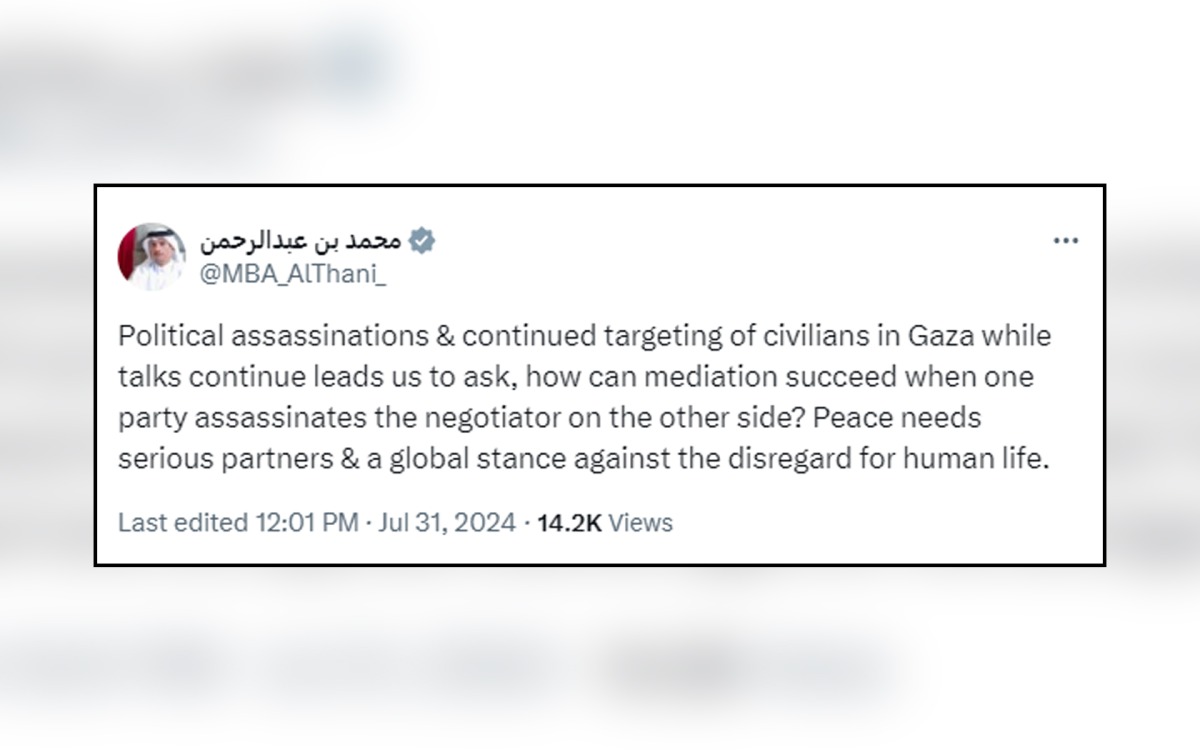In Doha, Qatar, the Prime Minister and Minister of Foreign Affairs of Qatar, HE Sheikh Mohammed bin Abdulrahman bin Jassim Al Thani, expressed skepticism about the success of future mediation efforts between Israel and Hamas. This doubt arises in the wake of the killing of Hamas’ political chief, Ismail Haniyeh, in Tehran. The Prime Minister raised concerns about political assassinations and the targeting of civilians in Gaza while negotiations are ongoing. He questioned how successful mediation can be when one party resorts to assassinating negotiators on the other side. According to HE Sheikh Mohammed bin Abdulrahman bin Jassim Al Thani, peace requires serious partners and a global stance against the disregard for human life.
As a key player in Qatar’s mediation efforts between Israel and Hamas, HE Sheikh Mohammed bin Abdulrahman bin Jassim Al Thani’s remarks carry significant weight. The Prime Minister highlighted the challenges facing mediation in the region, particularly in light of recent escalations and violence. The killing of Ismail Haniyeh has added a new layer of complexity to the already delicate negotiations between Israel and Hamas. HE Sheikh Mohammed bin Abdulrahman bin Jassim Al Thani emphasized the importance of having serious and committed partners in the peace process, as well as a global condemnation of actions that disregard human life. His statement underscores the need for a unified and principled approach to achieving peace in the region.
The Prime Minister’s comments reflect the deep-rooted concerns about the ongoing violence and conflict in Gaza and the broader Israeli-Palestinian conflict. The targeted killings of key figures, such as Ismail Haniyeh, only serve to further inflame tensions and complicate efforts to reach a peaceful resolution. HE Sheikh Mohammed bin Abdulrahman bin Jassim Al Thani’s criticism of such actions underscores the fundamental need for respect for human life and the rule of law in any mediation process. By calling for serious partners and a global stance against violence, the Prime Minister is advocating for a more principled and sustainable approach to achieving peace in the region.
The Prime Minister’s words also shed light on the broader geopolitical implications of the Israeli-Palestinian conflict and the role of regional and international actors in mediating peace. Qatar has played a key role in facilitating talks between Israel and Hamas, and HE Sheikh Mohammed bin Abdulrahman bin Jassim Al Thani’s comments signal a commitment to finding a peaceful resolution to the conflict. The killing of Ismail Haniyeh may have dealt a blow to these mediation efforts, but the Prime Minister’s call for serious partners and a global stance against violence is a clarion call for renewed commitment to the peace process. It is clear that achieving lasting peace in the region will require the concerted efforts of all stakeholders, and HE Sheikh Mohammed bin Abdulrahman bin Jassim Al Thani’s statement underscores the need for a unified and principled approach.
In conclusion, the comments made by Prime Minister and Minister of Foreign Affairs HE Sheikh Mohammed bin Abdulrahman bin Jassim Al Thani reflect the complex nature of the Israeli-Palestinian conflict and the challenges facing mediation efforts in the region. The killing of Ismail Haniyeh has raised doubts about the prospects for successful mediation between Israel and Hamas, but the Prime Minister’s words underscore the importance of having serious partners and a global stance against violence. Qatar’s commitment to mediating peace in the region remains unwavering, and HE Sheikh Mohammed bin Abdulrahman bin Jassim Al Thani’s call for a principled and unified approach serves as a reminder of the need for all stakeholders to work towards a sustainable and just resolution to the conflict. The road to peace may be fraught with challenges, but the Prime Minister’s words offer a ray of hope and a reaffirmation of the importance of dialogue, respect for human life, and a commitment to upholding the principles of peace and justice.










